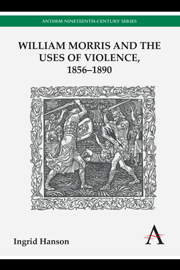Book contents
- Frontmatter
- Contents
- Acknowledgements
- Introduction Warriors Waiting for the Word
- Chapter One The Early Romances and the Transformative Touch of Violence
- Chapter Two Knightly Women and the Imagination of Battle in The Defence of Guenevere, and Other Poems
- Chapter Three Sigurd the Volsung and the Parameters of Manliness
- Chapter Four Crossing the River of Violence: The Germanic Antiwars and the Uncivilized Uses of Work and Play
- Chapter Five ‘All for the Cause’: Fellowship, Sacrifice and Fruitful War
- Afterword ‘Hopeful Strife and Blameless Peace’
- Notes
- Bibliography
- Index
Chapter Two - Knightly Women and the Imagination of Battle in The Defence of Guenevere, and Other Poems
Published online by Cambridge University Press: 05 July 2013
- Frontmatter
- Contents
- Acknowledgements
- Introduction Warriors Waiting for the Word
- Chapter One The Early Romances and the Transformative Touch of Violence
- Chapter Two Knightly Women and the Imagination of Battle in The Defence of Guenevere, and Other Poems
- Chapter Three Sigurd the Volsung and the Parameters of Manliness
- Chapter Four Crossing the River of Violence: The Germanic Antiwars and the Uncivilized Uses of Work and Play
- Chapter Five ‘All for the Cause’: Fellowship, Sacrifice and Fruitful War
- Afterword ‘Hopeful Strife and Blameless Peace’
- Notes
- Bibliography
- Index
Summary
In Morris's 1858 poem, ‘King Arthur's Tomb’, the despairing Guenevere, meeting Launcelot after their betrayal of Arthur, recalls the common terms of praise used about him in times past, when he was known as the ‘sword and shield of Arthur’. Instead, she cries, ‘you are found a crooked sword, I think, that leaves a scar / On the bearer's arm’. She extends the metonymic substitution of arms for the man into a metaphor for his effect on Arthur, drawing attention to the relationship between language, body and act in doing so. This is the central triangulated relationship of Morris's first volume of poems, The Defence of Guenevere, in which the interaction of imaginative language, confined or distorted bodies and acts of violence serves as a means of disrupting power relationships, gender roles and the moral consensus that sustains them. Published two years after the stories of the Oxford and Cambridge Magazine, still in the aftermath of the Crimean War, the poems dwell on medieval battle, the capture of prisoners and tales of their escape; written in the early days of Morris's friendship with Rossetti, they draw on intensities of feeling and distortions of form, both bodily and poetic, to disturb and disorient, working ‘against the grain of contemporary orthodoxy’ as J. B. Bullen notes in relation to the title poem. Shaping the narrated bodily experience and corporeal poetics of the poems is the ambiguous power of physical violence in the relations between people, particularly between men and women.
- Type
- Chapter
- Information
- William Morris and the Uses of Violence, 1856–1890 , pp. 31 - 64Publisher: Anthem PressPrint publication year: 2013



